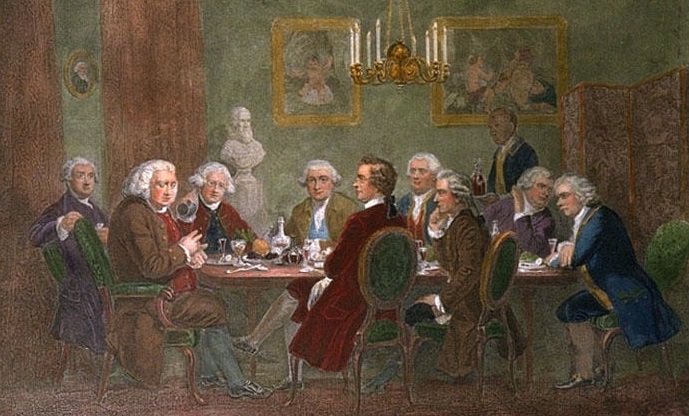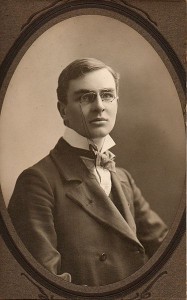
Churchill and Burke: “Spontaneous Humour, Unparaded Erudition”
1. Roberts on Burke
Reprised below are my small contributions on Churchill and the great Irish statesman and thinker Edmund Burke (1729-1797). It was eclipsed in 2019 in a brilliant speech by Andrew Roberts which the Hillsdale College Churchill Project offers here. Dr. Roberts spoke after receiving The New Criterion 7th Edmund Burke Award for Service to Culture and Society. He also discusses Churchill on Burke in a video interview with James Panero.
2. Churchill on Burke
A reader writes:
I’d like to congratulate you on Churchill by Himself, but I could not find any Churchill comments on Edmund Burke in the index. I thought Burke deserved a mention, but it’s your book, so it’s your call (and may I add, it has been one of the best treasures that has ever landed on my lap!) —V.T., England
Thanks for the kind words. Unfortunately the index is the worst feature of the book, and completely missed Burke. The 2016 Rosetta ebook, Churchill in His Own Words, is of course searchable. Both it and the 2012 international edition also contain a useful phrase index. Click these links or see the revolving books to the right >>>>.
Despite the index’s silence, there are five Churchill quotes on Burke, and a sixth by an observer….
1897: “What shadows we are…”
Looking at these shapeless forms, confined in a regulation blanket, the pride of race, the pomp of empire, the glory of war appeared but the faint and unsubstantial fabric of a dream; and I could not help realising with Burke: “What shadows we are and what shadows we pursue.”
Churchill was writing here of British dead in the campaign in the Northwest Frontier of India. (See The Story of the Malakand Field Force.) He nonetheless admired valiant enemies, like the Dervishes in The River War: “…their claim beyond the grave in respect of a valiant death was not less good than that which any of our countrymen could make.”
1939: “Importunate chink” of grasshoppers
[Burke said:] “Because half-a-dozen grasshoppers under a fern make the field ring with their importunate chink, whilst thousands of great cattle repose beneath the shadow of the British oak, chew the cud and are silent, pray do not imagine that those who make the noise are the only inhabitants of the field, that of course they are many in number; or that, after all, they are other than the little shrivelled, meagre, hopping, though loud and troublesome insects of the hour.”
Churchill was quoting Burke to Colin Thornton-Kemsley, chairman of the Chigwell Conservative Association, who wanted to dismiss WSC for his anti-Chamberlain rhetoric. When Churchill became prime minister, Thornton-Kemsley sent him his apologies. “I want to say only this,” he wrote. “You warned us repeatedly about the German danger and you were right: a grasshopper under a fern is not proud now that he made the field ring with his importunate chink.”
Churchill replied: “I certainly think that Englishmen ought to start fair with one another from the outset in so grievous a struggle and so far as I am concerned the past is dead.”
1941: Anglo-American unity
The great Burke has truly said, “People will not look forward to posterity who never look backward to their ancestors,” and I feel it most agreeable to recall to you that the Jeromes [Churchill’s maternal forebears] were rooted for many generations in American soil, and fought in Washington’s armies for the independence of the American Colonies and the foundation of the United States. I expect I was on both sides then. And I must say I feel on both sides of the Atlantic Ocean now.
The BBC had actively worked to keep Churchill off the air in the Appeasement years, but by 1941 they couldn’t get enough of him. Here he is broadcasting on 16 June 1941, six days before Hitler attacked Russia. His theme, as ever, was Collective Security, and he yearned for America to enter the war.
1951: “Reform without injustice”
A generation would no doubt come to whom their miseries were unknown but it would be sure of having more to eat and bless Stalin’s name. I did not repeat Burke’s dictum, “If I cannot have reform without injustice, I will not have reform.” With the World War going on all round us it seemed vain to moralise aloud.
Churchill is here writing in his fourth volume of Second World War memoirs, The Hinge of Fate. WSC was never given to moralizing—or, as we hear so disgustingly often today, “virtue signaling.” Morality was prominent in his make-up, but in war for him the first priority was “Victory at all costs—Victory in spite of all terror.”

3. Collin Brooks: “Where gusto is the prime quality”
One more reference to Burke in is on page 18. It is a lovely quotation by Collin Brooks about Churchill the conversationalist in Churchill by His Contemporaries (1953). Brooks captures the quality that endeared Churchill, even to political opponents:
“Never was a talker so variously gifted, so ardently listened-to, so little of a prig; never was a man so wedded to precision and verbal nicety so little of a pedant…. Sir Winston would have been equally welcomed by Falstaff in Eastcheap, Ben Jonson at The Mermaid, or Burke and Johnson at The Mitre, that is, in any coterie where the talk is masculine, the wit and humour spontaneous, the erudition unparaded, and where gusto is the prime quality.”






